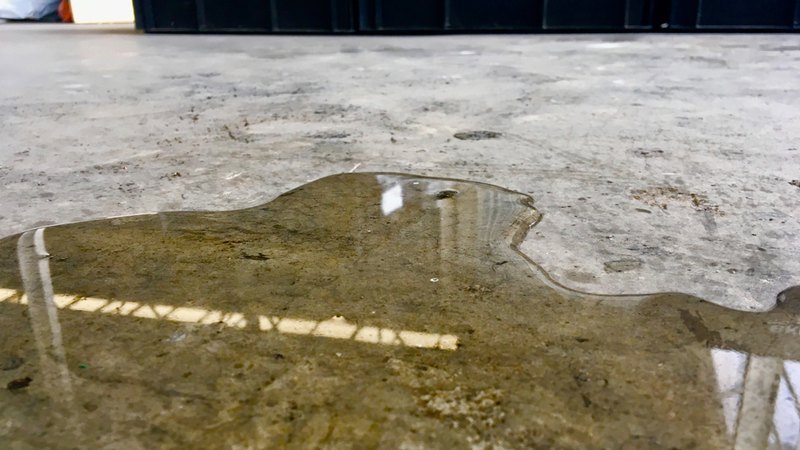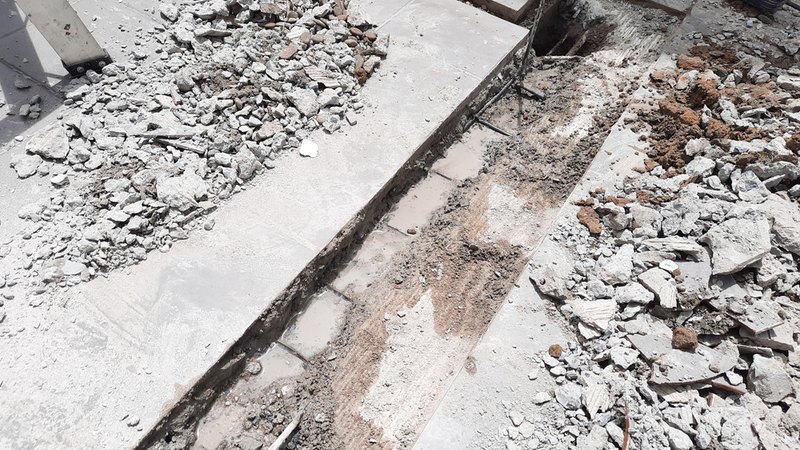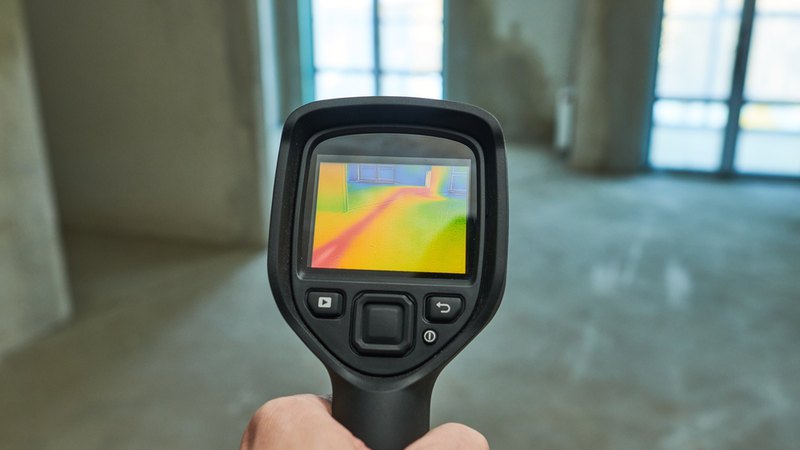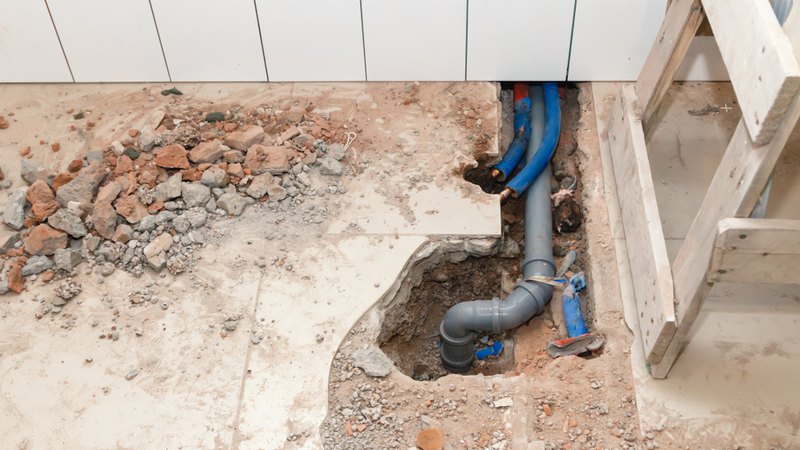
What is a Slab Leak? What Causes It and How to Repair
Slab leaks are a homeowner's nightmare. They can cause significant damage before being detected. These leaks occur beneath the concrete foundation, making them hard to find and repair. Understanding “what a slab leak is?” its causes, and repair methods are crucial for maintaining your home's structural integrity and avoiding costly damage. Austin Area Plumbers offers various plumber services, including slab leak detection, repair, and prevention. This article explains the common slab leak signs, how to identify them, and the best repair and prevention methods.

What is a Slab Leak?
Slab leaks are challenging to detect and repair due to their hidden nature, but understanding what they are and how they occur is crucial for maintaining your home's structural integrity and preventing costly damage. What is a slab leak? A slab leak is a leak that occurs in the water pipes located beneath the concrete foundation, or slab, of a home. These leaks can occur in both supply and drainage lines. They cause significant issues if not addressed promptly. Slab leaks often result from pipe corrosion, ground movement, and poor construction. Common signs include unexplained increases in water bills, the sound of running water when no faucets are on, damp or warm spots on the floor, and cracks in walls or flooring.
What causes a Slab Leak?
Slab leaks can be a major headache for homeowners. They cause significant damage and costly repairs if not addressed promptly. Understanding the common causes can help you take preventative measures and recognize early signs of trouble. What causes a slab leak?

Poor Construction and Installation
What should you do if you have a slab leak? First, you’ll need to identify the reason. One of the main causes of slab leaks is poor construction and improper installation of plumbing systems. This can happen for several reasons:
- Use of Substandard Materials: To cut costs, some builders use cheaper, low-quality materials. Pipes made from these materials are more prone to damage, corrosion, and leaks. For example, thin-walled pipes or those not designed to withstand high water pressure can fail prematurely, and you can experience slab leaks.
- Improper Installation Techniques: Even with good materials, bad installation can create problems. Pipes that are not securely fastened can shift or rub against the concrete, leading to leaks. Incorrect joining techniques or poor soldering can also result in weak joints that may fail under pressure.
- Insufficient Testing: If the plumbing system is not thoroughly tested before being covered with concrete, issues might go unnoticed until a leak occurs. Proper pressure testing and inspections of slab leak signs are essential to ensuring the system's integrity.
Soil Shifts and Ground Movement
The ground beneath a home constantly moves, which can impact the pipes under the slab. Several factors contribute to this:
- Soil Settling: Over time, the soil under a home's foundation naturally settles. This uneven pressure can cause pipes to bend, crack, or break. Homes built on poorly compacted soil are especially vulnerable.
- Expansive Clay Soils: In areas with expansive clay soils, the soil expands and contracts with moisture changes, so it can be a slab leak sign for you to consider. During wet periods, the soil swells, putting pressure on the pipes. During dry periods, it contracts, leaving gaps that cause pipes to shift or bend. This movement can eventually lead to cracks and leaks.
- Earthquakes and Seismic Activity: In regions prone to earthquakes, sudden shaking can cause severe damage to the plumbing system. Even minor seismic activity can stress pipes over time, leading to damage.
Abrasion and Wear Over Time
Abrasion and wear are common issues in plumbing systems, especially where pipes contact hard surfaces like concrete:
- Constant Water Flow: Continuous water seeping through the foundation slab creates friction, wearing down pipe walls over time. This is worse in areas with high water velocity or turbulence.
- Physical Contact with Concrete: Pipes laid on or through concrete slabs can wear down due to the abrasive nature of concrete. As pipes expand and contract with temperature changes, they rub against the concrete, gradually wearing away.
- Pipe Movement: Slight movements or vibrations, such as from a water hammer, can cause abrasion. Over time, this wear and tear can create small holes or cracks, leading to leaks.
High Water Pressure and Pipe Bursts
Excessively high water pressure is another major cause of slab leaks. Here's how it affects the plumbing system:
- Stress on Pipes and Joints: High water pressure puts extra stress on pipes and joints, increasing the risk of bursts and leaks. Pipes are designed to handle a specific pressure range, and exceeding this range can cause them to fail.
- Pressure Fluctuations: Rapid changes in water pressure, like a water hammer, create shock waves that stress pipes and fittings, causing cracks and leaks.
- Pressure-Regulating Valves: How to fix leaking pipe under the floor? You will need to install valves that help maintain safe water pressure levels, reducing the risk of pipe bursts and leaks. Regular maintenance and monitoring are essential to ensure they work correctly.
By understanding these common causes of slab leaks, homeowners can take proactive steps to prevent them. Regular inspections, proper installation practices, and addressing environmental factors can significantly reduce the risk of slab leaks and the costly damage they can cause.
Under Slab Leak Detection

Detecting a slab leak early is crucial to minimizing damage and repair costs. But how do you know if you have a slab leak? Here are some common symptoms and detection methods:
Symptoms and Warning Signs
- Unexplained increases in your water bill
- The sound of running water when no fixtures are in use
- Damp or warm spots on the floor
- Cracks in walls or flooring
- Mold or mildew growth with no apparent cause
- Reduced water pressure
Professional Under Slab Leak Detection Methods
- Electronic Leak Detection: Professionals use electronic devices to listen to the sound of water escaping from pipes.
- Infrared Thermography: This method uses thermal imaging to detect temperature differences caused by leaking water.
- Pressure Testing: By isolating and pressurizing the plumbing system, professionals can identify leaks based on pressure drops.
How To Detect Slab Leaks Yourself?
- Monitor your water bill for unexplained increases.
- Conduct a water meter test by turning off all water fixtures and observing if the meter continues to run.
- Inspect your home for damp spots, mold growth, and cracks in walls or floors.
Water Leak In the Slab and Potential Damage
Slab leaks can cause a range of issues that affect both the structure of your home and your wallet:
Structural Damage to the Foundation. Prolonged exposure to water seeping through the foundation slab, leads to cracks and structural instability. This can compromise the safety and integrity of your home.
Water Damage and Mold Growth. Water leaks into concrete slab floors, walls, and other structural components, causing extensive water damage. Moist environments also promote mold and mildew growth, which can pose health risks to you and your family.
Increased Water Bills and Utility Costs. Continuous water loss from a slab leak will result in higher water bills. Additionally, the cost of heating or cooling your home may increase if the leak affects your HVAC system.
Compromised Indoor Air Quality. As water seeps into your home's structural components and promotes mold growth, indoor air quality can be compromised. Mold spores and damp conditions can lead to poor air quality, which may cause respiratory issues and other health problems for the occupants of the home. Prolonged exposure to such environments can lead to chronic health issues and decreased overall well-being.
Damage to Personal Property. Water leaks in slabs can also damage personal property, including furniture, electronics, and other valuables. Items stored in basements or ground-level rooms are particularly vulnerable to water damage. Replacing or repairing these items can add to the overall cost of dealing with a slab leak.
How to Fix a Slab Leak?

Repairing a slab leak can be complex and often requires professional help. Here’s a detailed look at how to fix a slap leak:
Professional vs. DIY Repairs
While some minor leaks might be fixable by experienced DIYers, most slab leaks need professional expertise. Here's why:
- Location Challenges: Slab leaks occur under the foundation, making them hard to access without the right tools and knowledge.
- Potential Damage: Incorrect repairs can cause more leaks and structural damage.
- Safety Concerns: Working with plumbing under a concrete slab can be dangerous without proper training and equipment.
How Do You Fix a Slab Leak? Common Repair Methods
When it comes to fixing slab leaks, there are several effective methods that professionals use. Each method addresses the issue in different ways, depending on the severity and location of the leak.
Spot Repair
- Description: This method involves breaking the concrete slab. But how to fix a water leak under concrete? The professional needs to reach the leaking pipe and then repair or replace the damaged section.
- Pros: It's the most direct method and usually the least expensive.
- Cons: It can be very disruptive, causing significant noise and mess in your home. It also only addresses the specific leak and doesn’t prevent future leaks in other areas.
Rerouting
- Description: In this method, plumbers abandon the leaking pipe and install new pipes that bypass the damaged section.
- Pros: This method reduces the need to break through the slab extensively, minimizing disruption to your home.
- Cons: It can be more expensive due to the additional materials and labor involved. It’s a good long-term solution if multiple slab leaks are expected.
Epoxy Pipe Coating
- Description: A specialized epoxy is applied to the interior of the pipes, sealing any leaks and preventing future corrosion.
- Pros: This method is good for pipes with multiple leaks or extensive corrosion. It’s less invasive and can be done quickly.
- Cons: It’s not always a permanent fix, and the epoxy may degrade over time, especially if the water chemistry is harsh.
Preventing Slab Leak Symptoms
Prevention is key to avoiding the costly and disruptive repairs associated with slab leaks. Here are some tips for preventing slab leak symptoms:
Regular Maintenance and Inspections: Schedule regular inspections of your plumbing system to identify potential issues before they become serious problems. Pay special attention to areas prone to leaks, such as joints and connections.
Monitoring Water Pressure: Ensure your home's water pressure is within the recommended range (typically 40-60 psi). If necessary, install a pressure-regulating valve to prevent excessive pressure from damaging your pipes.
Using Quality Materials and Proper Installation: To avoid wondering, "How to stop a water leak in the concrete floor?" you need to use high-quality plumbing materials and ensure proper installation techniques are followed. Avoid cutting corners to save costs, as this can lead to long-term issues.
Addressing Ground Movement and Soil Issues: If your home is in an area prone to soil movement or expansive clay soils, consider taking measures to stabilize the ground around your foundation. This might include proper grading, installing drainage systems, or using soil stabilizers.
What to Do If You Have a Slab Leak? We will help!
Slab leaks are a serious issue that can cause major damage to your home if not fixed quickly. Knowing the common causes, warning signs, and slab leak repair services can help you protect your home from slab leaks. Regular maintenance and proactive measures can prevent slab leaks, keeping your home's foundation strong and safe. If you suspect a slab leak, it's important to get professional help to diagnose and know how to repair a slab leak.
At Austin Area Plumbing, we understand how common slab leaks can be. As a family, veteran, and woman-owned company, we are committed to providing excellent service to our community. We offer financing options for large plumbing jobs to help with the cost and ensure urgent issues are handled quickly. Our team of experienced professionals is dedicated to delivering reliable and efficient plumbing slab leakage solutions, helping you keep your home safe and sound.
Latest News and Useful Tips from Austin Area Plumbing
We explain why your shower diverter might be stuck and how to free it, what causes leaks and how to stop them, and why your water pressure might be weak and how to boost it.
Learn when to DIY plumbing or call a pro! Get tips on cost-effective fixes & expert services to tackle leaks, clogs & more. Make informed decisions now! Click or call 737-510-7479!
Get clog-free, smooth-flowing drains with our expert drain cleaning services! Fast, reliable, and mess-free solutions for your home or business! Click or call 737-510-7479!
Contact Us Today!
